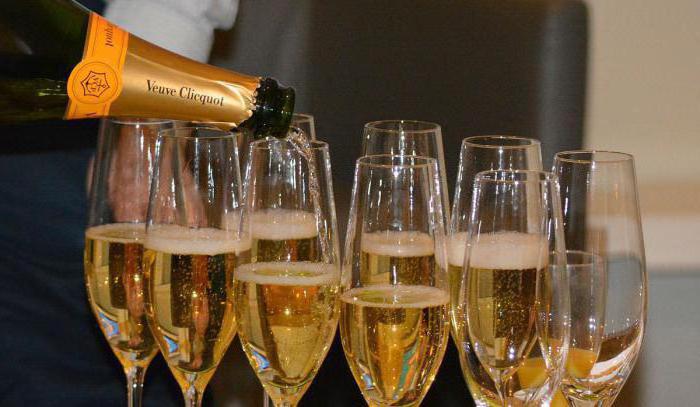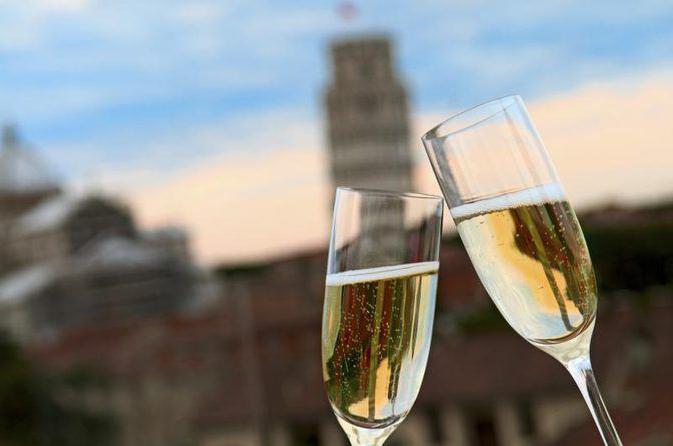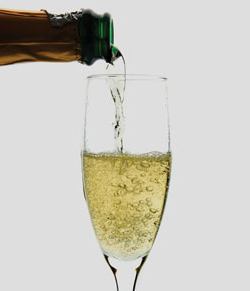Caloric content of champagne. Description of the most popular types of drink
Many people are mistaken, believing that champagneIs a separate kind of alcohol. In fact, this is a kind of wine, or rather, sparkling wine. And the drink is called so because it comes from the province of Champagne. At the moment, there are several thousand small businesses registered.
At the end of the 19th century, a document was signed in Madrid, according to which only sparkling wine made in Champagne can be called "champagne".
In addition to clear boundaries of origin, wine shouldmeet certain requirements, which establishes the "Interprofessional Committee of Champagne Wines". And the caloric content of champagne here does not play any role, although for many women this is the key factor when choosing a drink. But we will return to this topic a little later.
Where do they produce sparkling wines?
Wines that are not produced in Champagne, notonly have no right to be called champagne, but even the way of their production is called "classical", and not "champagne method." Although in fact the composition of the original champagne is no different from sparkling wines made in other regions and countries of the world.
Many states have long establishedproduction of such beverages. In some countries, wine made in this way has its own special name. For example, the Spaniards call their sparkling Cava, Italy is famous for its Spumante, and the Germans drink Sekt.
Even in some regions of France sparkling winehas the name Cremant. But in the post-Soviet space is very skeptical of such restrictions. On our shelves you can still see "Soviet champagne", moreover, not uncommon "Ukrainian champagne" or "Russian champagne."
Is champagne compatible with a healthy diet?
In our time, people who are watching their weight,becomes more and more. They strictly control the amount of calories that enter the body together with the products. Caloric content of champagne also excites very many, as this is one of the most popular spirits.
Some people do not allow themselves a piecedelicious baked goods, but how many calories in champagne semisweet (in a bottle or a glass), do not even think about. Although instead of three glasses of this sparkling drink, you can safely enjoy a piece of cake.

Let's start with the definition of champagne. This sparkling wine, which is produced only from a certain grape variety, grown on a certain territory.
Some of its species, especially sweet champagne,in small doses very much even have a beneficial effect on the human body. Drink can sometimes be used as an anti-stress drug. In addition, it improves blood flow, and in some cases even lowers blood pressure. Caloric content of champagne depends on its kind. Naturally, in sweet calories most of all, and least of all in dry (brut). But any product has energy value, and drinks are not an exception.
Are there many calories in sparkling wine?
The calorific value of champagne is directly affected by the nutritional value of grapes. But on the average it is 86 kilocalories per 100 ml sparkling drink.

Those who want to lose weight, you need to remember that,except for calories, it is also worthwhile to monitor the amount of carbohydrates consumed, and there are a lot of them in champagne. But the proteins, on the contrary, very little - 0.1 grams. Fats in the composition of the drink are completely absent.
Should I drink champagne?
The benefits of this drink, of course, is. Sparkling wine stimulates the respiratory and digestive organs. Some of its components are very beneficial for the process of bile secretion and increase the overall tone of the body.

But it is worth remembering that drinking champagneon an empty stomach is strictly prohibited. It irritates the mucous membrane of the digestive tract. And this, in turn, contributes to the development of acidosis. Like any alcohol, this drink adversely affects the body, especially when it comes to regular intake in large quantities. Do not abuse wine, especially sparkling wine. Your liver, your eyesight and your nervous system will suffer from this.
The composition of champagne can include several varieties of grapes, but they are also strictly regulated.
Types of Champagne
In terms of sugar content, this noble drink is divided into the following categories:
- Brut nature. To this species belong only the brands of expensive champagne. The most expensive wine material is used here. Such sparkling wine is produced only by the most prestigious producers, in particular Widow Clicquot, Dom Perignon, Moet and Chandon, Louis Rederer, Mumm, Circle and others. It is worth noting that, contrary to the prevailing opinion, wine material is not a synthetic powder, but grape must. So if you see the presence of this component in the wine, then do not be afraid. For slimming people this is the best option. The residual sugar here is no more than six grams per liter.

- Brut. This is the most popular champagne. But there is more sugar - up to 15 g per 1 liter.
- Extra-dry. This drink has long ceased to be popular, and now few produce it. Here the sugar content is 12-20 g.
- Dry. Drink, in which sugar from 17 to 35 grams per liter.
- Demi-sec. All your favorite semisweet wine with a sugar content of 33-50 g.
- Doux - sweet champagne. It is this drink that many women like to consume, even without realizing that its calorie content is just off scale. Here sugar is more than fifty grams per liter.
Categories of champagne
- Cuvees de prestige. This is the most expensive wine, it is produced only by the most famous Champagne Houses. Grapes come here only from the vineyards of the Grand Cru category. Wines of this category are often vintage, that is, they are subject to long exposure.

- Blanc de blancs. They are made only from the grape variety of Chardonnay.
- Blanc de noirs. White champagne, which is produced from dark varieties of grapes. This is a very expensive kind of wine, as the pulp from the peel is separated by hand.
Despite the caloric content, sparkling wines are popular, of course, if the composition of champagne is natural and the taste is appropriate.
</ p>

